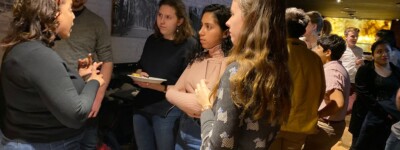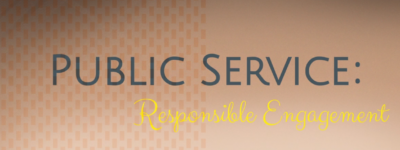Careers in Education
The field of education offers a wide range of career opportunities for liberal arts graduates both within, and outside, the classroom.
The field of education offers a wide range of career opportunities for liberal arts graduates both within, and outside, the classroom.

The job search process in the field of Education does not have to be a daunting task. Follow these steps below to get started:
Create three visions for yourself: when you think about the year(s) following your time studying at the university, what are three versions of yourself that you can imagine:

After you’ve completed the vision exercise, develop your target employer list. Look for 5-7 organizations/employers that align for each of your visions (i.e. 5-7 for Ideal, 5-7 for Best Alternative, and 5-7 for Wild). Once you’ve identified names of the organizations/employers that initially seem of interest to you, find the following information for each:
Make time to host informational interviews with contacts at the organizations that are of interest to you.

Within education, teaching is the area most often thought; however, there are opportunities in education administration, curriculum development, governance and leadership, and educational research and policy. An individual can choose to work within a public or private education setting, and it is not uncommon for young professionals to start their career in the classroom as a teacher, then use the knowledge gained from their teaching experience to expand into other professional roles in education.
Read the articles posted below on different job functional roles and environments to learn which skills are needed and which areas might be best suited for you. Or, access the articles here:

The Yale Education Studies Program (EDST) provides robust guidance and resources on obtaining Teaching Practice, including volunteering through clubs and local organizations, obtaining a formal teaching internship or part-time job in New Haven, engaging in international summer teaching, and post-graduate pathways into the teaching.
Join an EDST mailing list to receive news about informational gatherings and education-related opportunities:
Yale’s Poorvu Center for Teaching and Learning also provides resources for the teaching profession.
Education Alumni Community: Are you a Yale student or alum who is interested in connecting with fellow Yale students or alums who have worked in, or currently work in, Education? Be sure to visit the Peer Networking Lists in your Yale Career Link account and join the LinkedIn ‘Yale Careers in Education’ group.

There are several pathways to become a teacher in the United States:
What to consider when determining which teaching certification path is right for you:
Several organizations are positioned to hire and train students, or recent college graduates, to engage in the teaching profession outside of the United States. Examples include: Peace Corps, Fulbright English Teaching Assistantship, and Yale China Teaching Fellowships.

For those interested in public service work, whether that be through structured internship programs, post-graduate employment, community service, or volunteer work, it’s important to think about what responsible engagement looks like.
Review this page on Planning Public Service Projects to learn more about what responsible engagement looks like and how you can develop a plan that aligns well for you and the community you are hoping to serve.
Ignite Fellows lead small group virtual learning with the support of a veteran educator. Ignite Fellows:
At a minimum, Fellows must:
Apply for Ignite by May 2 to join our fall 2024 cohort
The Office of Career Strategy posts job …
Are you a motivated, energetic and responsible individual? Ever wanted to go to summer camp? We thought so! We are actively seeking people like you for Camp Promise in the Northeastern Pennsylvania area!! The backbone of our program is our …
Upcoming Events:
Graduate School & Further Education:
Intro to Achievement First
Join Achievement First professionals on Friday, March 1st, from 12PM – 12:30 PM as they dive deep into the ins and outs of a successful education job search and discuss …